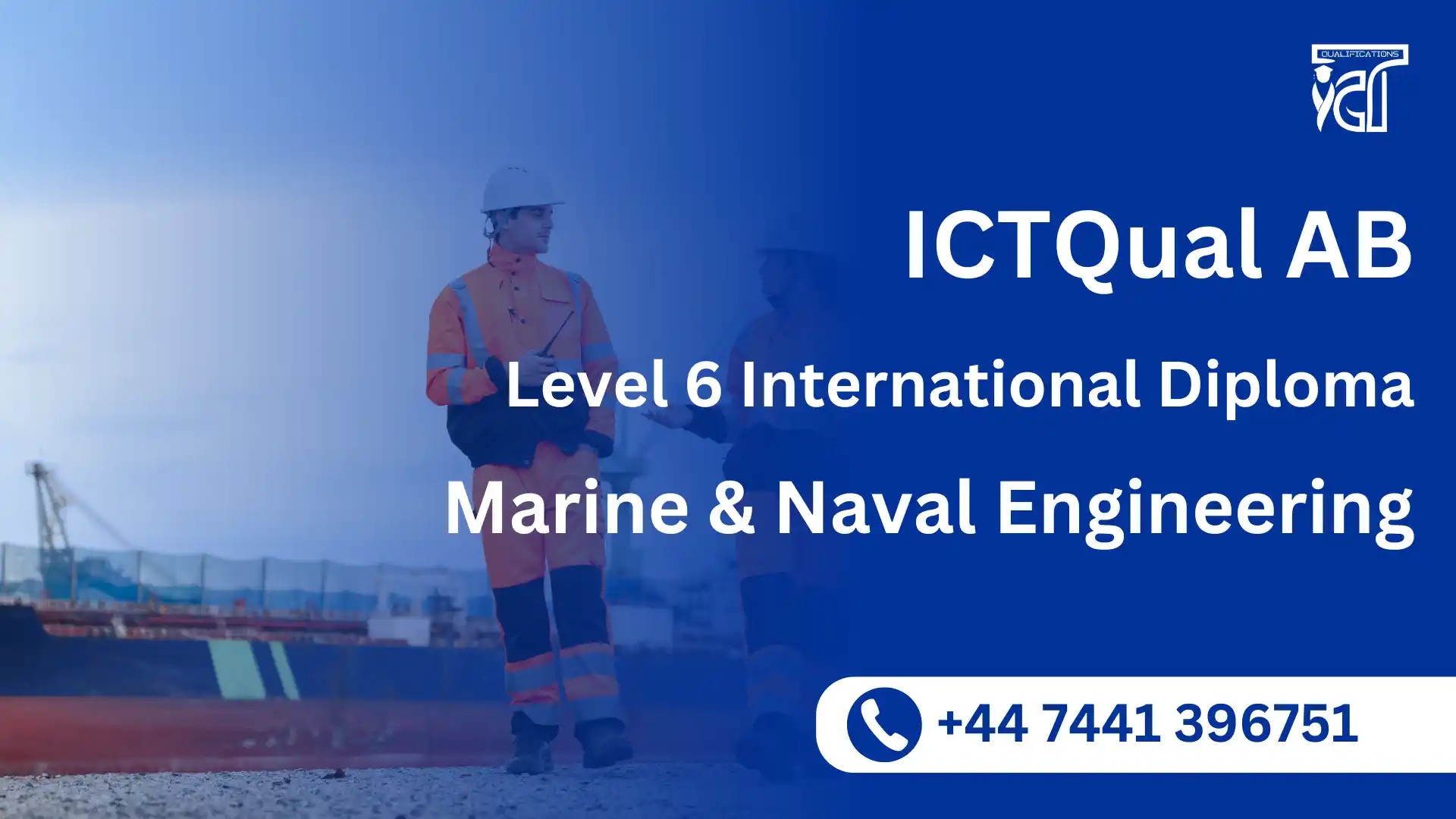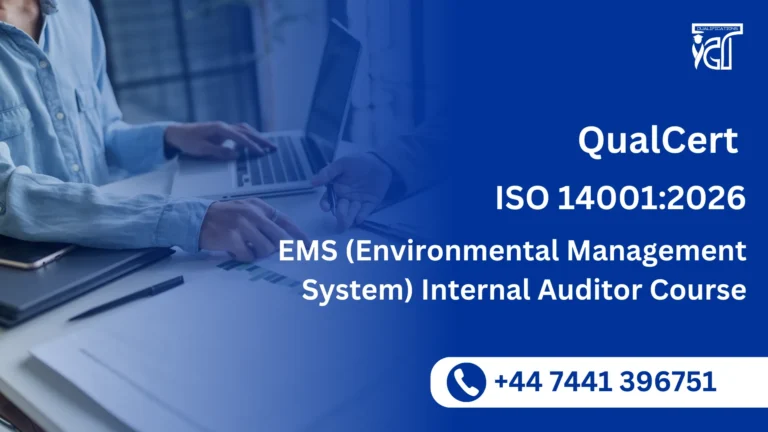The ICTQual AB Level 6 International Diploma in Marine and Naval Engineering is a world-class programme designed for learners eager to excel in one of the most dynamic and globally significant engineering sectors. Whether you are a fresher aiming to build a rewarding career in maritime technologies or a professional seeking to enhance your expertise, this diploma equips you with the advanced knowledge and technical skills demanded by today’s marine and naval industries.
Spanning three years and structured around 360 credits, the programme blends rigorous academic study with practical, industry-focused learning. Learners develop competencies in marine systems design, naval architecture, propulsion technologies, and modern engineering practices that power the world’s shipping, offshore, and defence operations. By mastering cutting-edge methodologies, you will be prepared to tackle real-world challenges in shipbuilding, maintenance, and marine innovation.
This diploma offers exceptional career opportunities in shipyards, naval forces, offshore energy, marine consultancy, and global maritime engineering firms. Fresh learners gain a solid foundation for entry-level roles, while experienced professionals can fast-track their progression into senior engineering, supervisory, or project management positions.
Key benefits include gaining a recognised international qualification, developing problem-solving and leadership skills, and enhancing your employability in a competitive global market. The programme is carefully designed to align with current industry standards, ensuring that learners graduate with relevant, future-ready expertise.
By completing the Level 6 International Diploma in Marine and Naval Engineering, you will be equipped to make a meaningful impact in a sector vital to global trade, energy, and security, positioning yourself for long-term success and career advancement anywhere in the world.
ICTQual AB Level 6 International Diploma in Marine and Naval Engineering
This qualification, the ICTQual AB Level 6 International Diploma in Marine and Naval Engineering, consists of 36 mandatory units.
Year 1 – Foundation in Marine and Naval Engineering
- Principles of Marine and Naval Engineering
- Engineering Mathematics
- Fundamentals of Mechanical and Electrical Engineering
- Materials Science and Engineering
- Engineering Drawing and Computer-Aided Design (CAD)
- Introduction to Fluid Mechanics and Hydrodynamics
- Basics of Marine Propulsion Systems
- Naval Architecture – Fundamentals
- Marine Structures and Ship Construction
- Health, Safety, and Environmental Practices in Maritime Engineering
- Communication and Technical Report Writing
- Introduction to Project Management in Engineering
Year 2 – Intermediate Studies in Marine and Naval Engineering
- Marine Hydrodynamics and Stability
- Marine Propulsion and Power Systems
- Structural Analysis and Ship Design
- Offshore and Coastal Engineering – Fundamentals
- Marine Electrical and Control Systems
- Materials and Corrosion in Marine Environments
- Marine Maintenance and Reliability Engineering
- Computational Methods in Naval Architecture
- Sustainable Maritime Engineering and Green Technologies
- Applied Research Methods in Marine Engineering
- Port and Harbour Engineering – Basics
- Project Planning and Marine Operations Management
Year 3 – Advanced Studies in Marine and Naval Engineering
- Advanced Ship Design and Modelling
- Advanced Propulsion and Power Plant Systems
- Offshore Structures and Subsea Engineering
- Advanced Hydrodynamics and Computational Fluid Dynamics (CFD)
- Naval Defence Systems and Military Applications
- Smart Marine Technologies and Industry 4.0
- Robotics and Autonomous Systems in Maritime Engineering
- Cyber-Physical Systems and IoT in Marine Engineering
- Professional Ethics and Sustainability in Marine & Naval Engineering
- Innovation and Entrepreneurship in Marine Technology
- Infrastructure and Facility Planning for Maritime Systems
- Final Year Major Project (Capstone Project)
Learning Outcomes for the ICTQual AB Level 6 International Diploma in Marine and Naval Engineering:
Year 1 – Foundation in Marine and Naval Engineering
Principles of Marine and Naval Engineering
- Understand the scope and applications of marine and naval engineering.
- Explain the principles of ship design, naval architecture, and marine systems.
- Recognise key components and operational requirements of maritime vessels.
Engineering Mathematics
- Apply algebra, calculus, and trigonometry to engineering problems.
- Develop mathematical models for marine and naval systems.
- Solve technical problems using numerical and analytical methods.
Fundamentals of Mechanical and Electrical Engineering
- Understand mechanical principles including motion, energy, and mechanics.
- Explain electrical fundamentals including current, voltage, and resistance.
- Apply mechanical and electrical concepts to practical maritime engineering tasks.
Materials Science and Engineering
- Identify materials used in marine and naval applications.
- Understand the relationship between material properties and performance.
- Select suitable materials for marine construction and engineering systems.
Engineering Drawing and Computer-Aided Design (CAD)
- Interpret technical drawings using international standards.
- Develop 2D and 3D models using CAD software.
- Apply dimensioning and tolerancing principles in marine engineering designs.
Introduction to Fluid Mechanics and Hydrodynamics
- Understand principles of fluid flow and hydrodynamics.
- Analyse the behaviour of fluids in marine environments.
- Apply fluid mechanics to ship hull design and offshore structures.
Basics of Marine Propulsion Systems
- Explain different types of marine propulsion systems.
- Analyse the performance of propellers, engines, and power transmission.
- Understand the principles of efficiency, thrust, and fuel consumption.
Naval Architecture – Fundamentals
- Understand basic ship design principles and hull geometry.
- Analyse stability, buoyancy, and weight distribution in vessels.
- Apply naval architecture concepts to simple ship design problems.
Marine Structures and Ship Construction
- Identify structural components of ships and marine platforms.
- Understand construction techniques and material selection.
- Evaluate structural integrity and strength of marine structures.
Health, Safety, and Environmental Practices in Maritime Engineering
- Apply maritime safety regulations and risk assessments.
- Identify hazards in shipbuilding and offshore operations.
- Implement environmentally sustainable practices in marine engineering.
Communication and Technical Report Writing
- Develop professional written and verbal communication skills.
- Prepare structured technical reports and documentation.
- Apply referencing and technical writing standards in marine contexts.
Introduction to Project Management in Engineering
- Understand project management principles and lifecycle.
- Apply planning, scheduling, and resource allocation tools.
- Analyse risk, cost, and quality in marine engineering projects.
Year 2 – Intermediate Studies in Marine & Naval Engineering
Marine Hydrodynamics and Stability
- Analyse ship stability under different loading and sea conditions.
- Apply hydrostatic and hydrodynamic principles to vessel behaviour.
- Evaluate the effect of waves and currents on marine operations.
Marine Propulsion and Power Systems
- Understand advanced marine engines and propulsion systems.
- Analyse power transmission and efficiency of marine vessels.
- Apply thermodynamic principles to marine propulsion.
Structural Analysis and Ship Design
- Perform stress, strain, and deflection analysis on ship components.
- Apply design principles for hulls and marine superstructures.
- Evaluate safety, durability, and performance of marine structures.
Offshore and Coastal Engineering – Fundamentals
- Understand design and construction of offshore platforms.
- Analyse coastal processes and their impact on structures.
- Apply engineering solutions for offshore and coastal projects.
Marine Electrical and Control Systems
- Explain shipboard electrical systems and instrumentation.
- Apply control theory to marine automation systems.
- Understand monitoring and safety systems in maritime environments.
Materials and Corrosion in Marine Environments
- Identify corrosion mechanisms in marine applications.
- Apply protective coatings and materials selection for durability.
- Analyse material performance in saltwater and harsh conditions.
Marine Maintenance and Reliability Engineering
- Develop maintenance strategies for ships and offshore structures.
- Analyse failure modes and implement reliability engineering principles.
- Apply condition monitoring techniques for predictive maintenance.
Computational Methods in Naval Architecture
- Use computational tools to model marine systems and structures.
- Apply simulation techniques for hull design and stability analysis.
- Interpret computational results for engineering decision-making.
Sustainable Maritime Engineering and Green Technologies
- Understand environmental challenges in the marine sector.
- Analyse fuel-efficient, low-emission, and renewable technologies.
- Apply sustainability principles in ship design and operations.
Applied Research Methods in Marine Engineering
- Develop research proposals and methodologies in marine contexts.
- Collect, analyse, and interpret technical data.
- Present findings in structured and professional formats.
Port and Harbour Engineering – Basics
- Understand the design and operation of ports and harbours.
- Analyse coastal structures, breakwaters, and docking facilities.
- Apply planning principles for maritime infrastructure development.
Project Planning and Marine Operations Management
- Understand operational management in shipping and offshore projects.
- Apply project planning tools, scheduling, and resource management.
- Evaluate risk, safety, and cost-efficiency in marine operations.
Year 3 – Advanced Studies in Marine & Naval Engineering
Advanced Ship Design and Modelling
- Develop complex ship designs using advanced CAD and simulation tools.
- Analyse structural integrity and hydrodynamic performance.
- Apply optimisation techniques for vessel efficiency and safety.
Advanced Propulsion and Power Plant Systems
- Understand high-performance marine engines and energy systems.
- Analyse power generation, transmission, and fuel efficiency.
- Apply thermodynamic and mechanical principles to advanced propulsion.
Offshore Structures and Subsea Engineering
- Design and evaluate offshore platforms and subsea systems.
- Analyse structural behaviour under environmental loads.
- Apply advanced engineering solutions for deep-water operations.
Advanced Hydrodynamics and Computational Fluid Dynamics (CFD)
- Use CFD to simulate fluid-structure interaction.
- Analyse wave forces, drag, and stability in complex marine conditions.
- Evaluate results to improve ship design and offshore operations.
Naval Defence Systems and Military Applications
- Understand principles of naval weapon systems and defence platforms.
- Analyse shipboard combat and surveillance systems.
- Apply engineering concepts to military and strategic maritime applications.
Smart Marine Technologies and Industry 4.0
- Explore automation, digital twins, and IoT in maritime engineering.
- Apply smart monitoring and predictive maintenance solutions.
- Analyse integration of advanced technologies in ships and ports.
Robotics and Autonomous Systems in Maritime Engineering
- Understand autonomous ships, UAVs, and underwater vehicles.
- Apply robotics principles for marine inspection and maintenance.
- Evaluate safety and operational efficiency of autonomous maritime systems.
Cyber-Physical Systems and IoT in Marine Engineering
- Integrate hardware, software, and communication networks for marine applications.
- Apply IoT protocols for real-time monitoring and data collection.
- Design cyber-physical systems for offshore and naval operations.
Professional Ethics and Sustainability in Marine & Naval Engineering
- Understand ethical responsibilities in maritime and naval engineering.
- Apply sustainability principles to shipbuilding and offshore projects.
- Analyse social and environmental impact of engineering solutions.
Innovation and Entrepreneurship in Marine Technology
- Develop innovative approaches to marine engineering challenges.
- Apply entrepreneurial skills to maritime technology ventures.
- Create business models for marine and offshore engineering solutions.
Infrastructure and Facility Planning for Maritime Systems
- Plan and design ports, shipyards, and offshore facilities.
- Analyse operational efficiency and layout optimisation.
- Apply strategic planning principles for maritime infrastructure projects.
Final Year Major Project (Capstone Project)
- Undertake independent applied research or engineering project.
- Integrate knowledge from multiple disciplines within marine and naval engineering.
- Present findings through a professional report and presentation.
Course Benefits – ICTQual AB Level 6 International Diploma in Marine and Naval Engineering
This advanced diploma offers a comprehensive blend of technical expertise, industry relevance, and practical application, empowering learners to excel in marine and naval engineering. Whether entering the field as a fresher or seeking advancement as an experienced professional, learners gain valuable skills, recognised credentials, and global career opportunities in one of the world’s most vital engineering sectors.
1. Industry-Relevant Knowledge
- Covers marine systems design, naval architecture, propulsion, and offshore engineering.
- Aligned with current global maritime and naval industry standards.
- Ensures learners gain future-ready expertise for evolving technologies.
2. Enhanced Career Opportunities
- Opens pathways to roles in shipyards, offshore energy, naval forces, and marine consultancy.
- Supports progression to senior engineering, supervisory, or project management positions.
- Widens employability prospects in international maritime engineering firms.
3. Practical and Applied Learning
- Combines theoretical knowledge with real-world case studies and projects.
- Develops hands-on problem-solving skills for marine and naval challenges.
- Prepares learners for both technical and leadership responsibilities.
4. Professional Recognition and Global Mobility
- Recognised internationally, adding credibility to professional profiles.
- Supports long-term career growth across diverse geographical markets.
- Builds confidence to work in high-demand marine and naval sectors worldwide.
5. Personal and Leadership Development
- Enhances analytical, critical thinking, and decision-making abilities.
- Strengthens leadership, communication, and teamwork skills.
- Encourages continuous professional growth and adaptability.
Ideal Learner – ICTQual AB Level 6 International Diploma in Marine and Naval Engineering
The ideal learner for this diploma is someone passionate about marine technologies, naval innovation, and global engineering excellence. This programme suits both fresh learners eager to enter the maritime sector and professionals looking to upgrade their expertise for career advancement.
Fresh Learners and Graduates
- Individuals interested in building a strong foundation in marine and naval engineering.
- Learners seeking a globally recognised qualification to start a career in shipbuilding, offshore energy, or naval operations.
Experienced Professionals
- Engineers, technicians, or maritime personnel aiming to progress into senior, supervisory, or project management roles.
- Professionals seeking to update their knowledge to match the latest advancements in marine technologies.
Aspiring Innovators and Problem-Solvers
- Learners who enjoy analytical thinking, design, and solving complex engineering challenges.
- Those motivated to contribute to innovations in shipping, naval defence, or offshore engineering.
Career-Focused Individuals
- Learners who value practical, industry-aligned training with clear pathways to international opportunities.
- Individuals aiming for a stable, high-demand career in a sector essential to global trade and security.
Global Learners with Long-Term Goals
- Those seeking professional recognition and mobility across international markets.
- Learners committed to continuous development and leadership within the maritime and naval industries.
Completing the ICTQual AB Level 6 International Diploma in Marine and Naval Engineering opens diverse pathways for learners to advance academically, professionally, and globally. This qualification is designed to build a strong foundation for long-term growth, whether you aim to pursue higher education, enhance your professional standing, or expand your career internationally.
1. Advanced Academic Pathways
- Progress to Level 7 postgraduate diplomas or master’s degrees in Marine Engineering, Naval Architecture, Offshore Engineering, or related fields.
- Gain entry into specialised maritime research programmes or advanced technical certifications.
- Strengthen your academic profile for roles in teaching or training within the engineering sector.
2. Professional Career Advancement
- Qualify for senior engineering positions in shipbuilding, offshore energy, and naval forces.
- Transition into leadership roles such as project manager, marine superintendent, or operations manager.
- Build credibility for consulting opportunities in maritime engineering and defence sectors.
3. Global Employment Opportunities
- Access career openings in international shipyards, naval defence organisations, and marine consultancies.
- Leverage the diploma’s international recognition to work on projects across global markets.
- Enhance mobility for roles in regions where marine and naval engineering is critical to economic growth.
4. Entrepreneurial and Innovation Roles
- Launch marine engineering start-ups or consultancy services.
- Contribute to innovation in sustainable marine technologies, renewable offshore energy, or naval systems.
- Play a key role in shaping the future of maritime infrastructure and defence.
5. Professional Memberships and Networking
- Strengthen eligibility for membership in recognised marine or engineering professional bodies.
- Build a global network of industry experts, employers, and peers for long-term career support.
- Participate in conferences, seminars, and collaborations that expand industry influence and opportunities.
As an approved ICTQual AB centre, we provide two flexible certification routes to ensure that every learner can progress according to their background and career goals. By enrolling with us, you gain access to a structured, internationally recognised qualification designed to meet industry standards and enhance your professional journey.
Route 1: Experienced Professionals
- Designed for learners with at least six years of verifiable experience in marine, naval, or related engineering fields.
- Recognises your prior learning and expertise, enabling a fast-track pathway to certification.
- Focuses on advanced modules and practical assessments tailored to your existing knowledge.
- Ideal for professionals aiming to validate their skills, secure senior roles, or move into specialised or leadership positions.
Route 2: Fresh Learners and New Entrants
- Created for learners new to marine and naval engineering or those with limited work experience.
- Requires the completion of 36 structured assignments designed to build a comprehensive foundation in marine systems, naval architecture, and engineering practices.
- Offers step-by-step guidance and tutor support to develop both technical and problem-solving skills.
- Perfect for fresh candidates seeking a recognised qualification to launch a successful career in the maritime and naval industries.
By enrolling through either route, you benefit from our commitment to quality, professional support, and a globally respected qualification that equips you to excel in marine and naval engineering.
Entry Requirements
To ensure learners are well-prepared for the demands of this advanced qualification, the following entry requirements apply:
Minimum Age
- Learners must be at least 18 years old at the time of enrolment.
Educational Background
- A recognised Level 5 Diploma or equivalent qualification in Engineering, Marine Engineering, or a related discipline.
- Alternatively, learners with a strong academic foundation in science, technology, or mathematics may also be considered.
Professional Experience
- Route 1 (Experienced Professionals): At least six years of verifiable work experience in marine, naval, or related engineering fields.
- Route 2 (Fresh Learners): No prior industry experience required, but completion of 36 assignments is mandatory to build foundational knowledge.
Language Proficiency
- Learners must demonstrate a good command of English, as all study materials, assignments, and assessments are conducted in English.
- Proficiency can be evidenced through prior education in English or a recognised language test (e.g., IELTS 5.5 or equivalent).
Register Now
Qualification Process
Qualification Process for the ICTQual AB Level 6 International Diploma in Marine and Naval Engineering
- Self-Assessment:
Begin by evaluating your eligibility to ensure you meet the qualification requirements, including work experience, knowledge, and language proficiency. - Registration:
Complete your registration by submitting the required documents, including a scanned copy of a valid ID, and paying the registration fee. - Induction:
An assessor will conduct an induction to confirm your eligibility for the course and explain the evidence requirements. If you do not meet the criteria, your registration will be cancelled, and the fee will be refunded. - Assignments & Evidence Submission:
Provide all assignments and the necessary evidence based on the assessment criteria outlined in the course. If you are unsure of the required evidence, consult with the assessor for guidance on the type and nature of evidence needed. - Feedback and Revision:
The assessor will review your submitted evidence and provide feedback. Evidence that meets the criteria will be marked as “Criteria Met,” while any gaps will be identified. You will be asked to revise and resubmit if needed. - Competence Evidence:
Submit final evidence demonstrating that all learning outcomes have been met. This evidence will be marked as “Criteria Met” by the assessor once it is satisfactory. - Internal Quality Assurance (IQA):
The Internal Quality Assurance Verifier (IQA) will review your evidence to ensure consistency, quality, and compliance with standards. - External Verification:
The IQA will submit your portfolio to ICTQUAL AB External Quality Assurance Verifiers (EQA) for final confirmation. The EQA may contact you directly to verify the authenticity of your evidence. - Certification:
Upon successful completion of all checks, ICTQUAL AB will issue your official certificate, confirming that you have attained the ICTQual AB Level 6 International Diploma in Marine and Naval Engineering.







